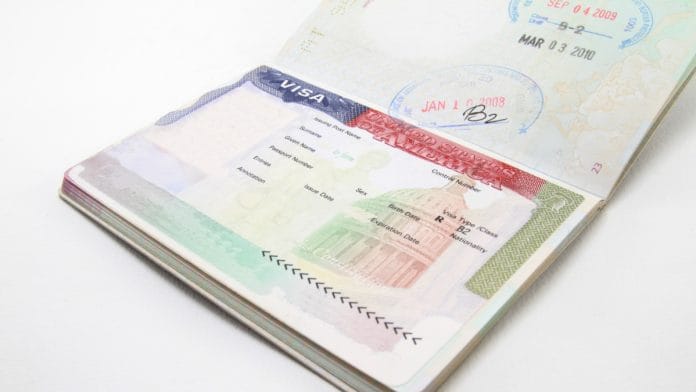New Delhi: Hours after his inauguration as the 47th US President, Donald Trump signed an executive order that could upend the country’s immigration policy and impact Indian immigrants—the second largest group of foreign-born nationals after Mexicans. The order still needs to pass legal hurdles.
On Monday, Trump moved to end citizenship rights for children born in the US to non-citizens or those on temporary visas. His order, ‘Protecting the Meaning and Value of American Citizenship,’ said that for a child born in the US to acquire citizenship, at least one parent must be a US citizen, a lawful permanent resident (green card holder), or a member of the US military.
It further directed the administration to withhold official documents, such as passports, from individuals it deems ineligible for citizenship and reject any documents from local or state authorities that claim to recognise the citizenship of children it has deemed ineligible.
“All illegal entry will be immediately halted and we will begin the process of returning millions and millions of illegal aliens back to the places from which they came,” Trump said in his inauguration speech earlier.
Within minutes of signing the order, Trump was hit with a lawsuit that contended that it violated the 14th Amendment of the US Constitution as well as federal law that dates back 80 years. ThePrint explains what birthright citizenship is, the legal hurdles and its impact on immigrants.
Also Read: ‘In America, impossible is what we do best,’ says Trump in inaugural address, promises ‘golden age’
Birthright citizenship enshrined in US Constitution
According to the 14th Amendment of the US Constitution, birthright citizenship guarantees that any child born on American soil automatically becomes a US citizen, regardless of the immigration status of their parents. Ratified in 1868, this provision was initially aimed at securing citizenship for formerly enslaved Black Americans in the post-Civil War era.
It further prohibits states from making or enforcing “any law which shall abridge the privileges or immunities of citizens”.
Trump has been vocal about his desire to end the current system, terming birthright citizenship “the biggest magnet for illegal immigration”, particularly from countries with high immigration rates to the US, like India and China.
His administration claims that the 14th Amendment has been “misinterpreted” and that the Constitution does not grant automatic citizenship to the children of undocumented immigrants or those on temporary visas. Trump has often framed the issue as a matter of national security and the preservation of American values, claiming that the practice of granting citizenship to children of non-citizens is “ridiculous”.
At a briefing from the incoming administration, hours before Trump was sworn in, a White House official emphasised that the administration is looking at curbing “birth tourism”—when women allegedly travel to the US to give birth, ensuring the children become US citizens. A lack of proper data makes determining the accuracy of the claim and extent of this practice difficult.
During his first term, Trump had introduced new rules to make it more difficult for foreign nationals to enter the US to give birth.
Legal hurdles up ahead
In light of Trump’s election victory, rights and advocacy groups, among others, have been preparing to challenge the new administration’s attempts to clamp down on legal immigration routes.
In the lawsuit filed at a federal court in New Hampshire Monday, immigrant advocacy organisations, including the American Civil Liberties Union (ACLU), the Asian Law Caucus, and the NAACP Legal Defense Fund, argued that Trump’s executive order was unconstitutional.
The suit further claims that the president does not have the authority to unilaterally alter American citizenship and that his directive could result in some children becoming stateless.
In a landmark 1898 decision, United States v. Wong Kim Ark, the US Supreme Court set a precedent by ruling that a child born in the US to non-citizen parents is still a US citizen.
Furthermore, any attempt to alter birthright citizenship also requires a constitutional amendment. This further needs a two-thirds majority vote in both the House and Senate, followed by ratification by three-fourths of the state legislatures.
Impact on Indian immigrants
The executive order, which goes into effect in 30 days, will make children born to foreign nationals on temporary visas or those waiting for permanent residency ineligible to automatically gain US citizenship.
This could affect thousands of children each year, with implications for their ability to access citizenship rights, including the ability to petition for their parents’ green cards once they turn 21.
The impact on the Indian-origin community would also be significant, given that it is one of the fastest growing immigrant communities in the US. As of 2024, Indian Americans account for 1.47 percent of the US population and at least two-thirds of the 5.4 million Indian Americans are immigrants, according to US government data. According to Pew Research Center, Indians make up the third largest group of undocumented immigrants in US at close to 7.25 lakh.
Indian immigrants include individuals who are on the H-1B work visa programme, awaiting green cards (permanent residency), or studying. Indian students represent one of the largest groups of international students in the US, especially in fields like technology and engineering.
The potential loss of automatic citizenship could also exacerbate a green card backlog as well. Indian nationals, in particular, face some of the longest wait times in the world to obtain a green card, sometimes stretching for decades.
Moreover, US citizens—including those born to immigrant parents—would lose birth certificates as guaranteed proof of citizenship.
(Edited by Sanya Mathur)






